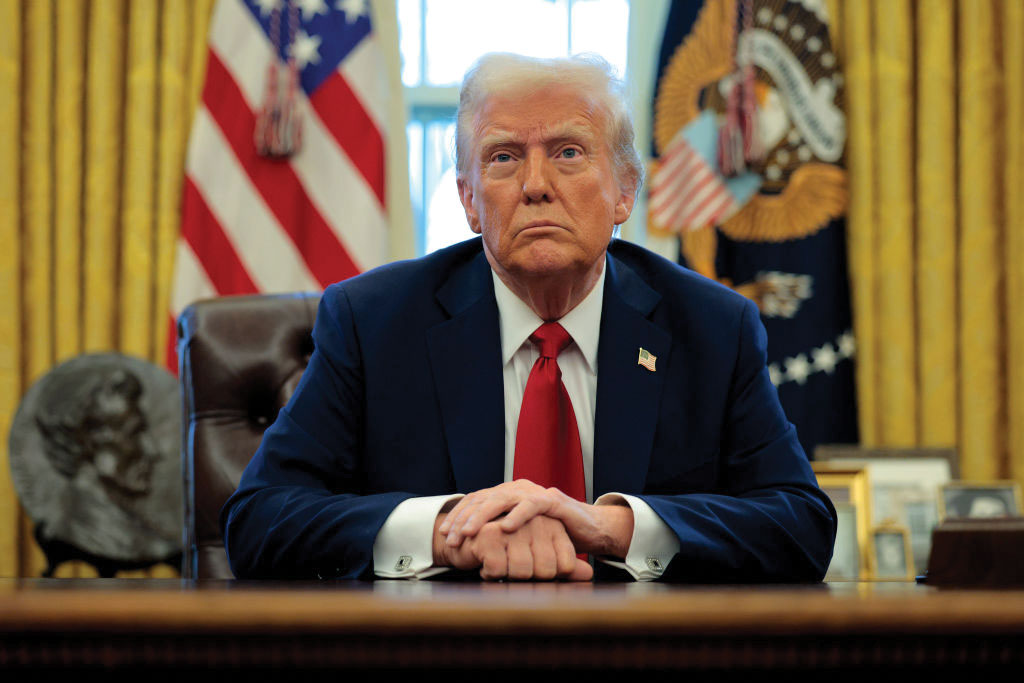
Let’s get one thing out of the way that we can all agree on. The first two weeks of the Trump presidency have been a demolition derby like we’ve never seen. The frenetic pace of the first 100 hours that we considered “unprecedented” has managed to maintain its breakneck speed.
Beyond the obvious issue — how people feel about the moves themselves — there is the sheer volume of activity that makes it difficult to follow and analyze with any depth.
This blizzard of executive orders, assaults on DEI, controversial cabinet nominations, threats of trade wars, incendiary comments and countless daily provocations have created a kind of news whirlwind that has made us all dizzy.
So we’re getting lots of stories about the demolition derby itself. “President Trump’s ambition has been sweeping and muscular in the first days of his new term,” begins a story in The Wall Street Journal, “producing less of a transition in government than a takeover.”
Bret Stephens, in his back and forth with Gail Collins in The New York Times, went a step further, saying “it already feels like a presidency that’s off the rails.”
If you didn’t vote for Trump, you have an all-you-can-eat buffet of outrage to feast from. The red meat on that buffet comes from “first buddy” Elon Musk, who is quickly becoming the most outspoken man in the land. Those who oppose him say he has no right to wield such power, given his conflict of interests and the fact that no one elected him (although he was officially appointed by Trump on Feb. 3 as a “special government employee.”)
But those who support him say it’s about time someone came along to make our government more transparent and accountable while cutting waste and fraud and bringing our runaway spending under control. Musk is breaking so many eggs in the process, everyone in D.C. must be having omelets for breakfast.
Trump’s critics, especially among Democrats, are alarmed by how far he’s willing to go to test the limits of the Constitution. They accuse him of “kicking aside Congress” with his sweeping claims of presidential power.
There was plenty of power-grabbing at the start of his first term in 2017, but nothing like this. This Trump 2.0 version feels more deliberate, more lethal, as if his closest advisors spent the past four years planning for exactly this moment so they could hit the ground not running but racing.
Given this more over-the-top Trump, why is the resistance so much weaker this time around?
I have a theory, and it comes from Gallup. In a December poll, it found that only 19% of Americans believed the country was going in the right direction. That’s four out of five Americans who didn’t like where their country is going.
That’s a lot of unhappy Americans!
My theory is that because Trump inherited a nation that was so dissatisfied, many people felt they had little to lose by giving him a lot of rope. Maybe they figured that a radical disruption of failed institutions that essentially lost the people’s trust might be just what the doctor ordered.
In any case, Trump is such a divisive figure it’s almost impossible to cover him without alienating some people. Those who loathe Trump don’t want to hear that he can do anything good; while those who love him don’t want to hear that he can do anything bad.
Even Bret Stephens, who said Trump’s presidency is off the rails, conceded that “as terrible as he is on some issues, he’s done well on others.”
When Collins challenged him to come up with two good things Trump has done, this was his response, which is worth quoting in full:
“I’ll name more than two. Ending D.E.I. in the federal government — and thereby the relentless racialization and genderization of personnel management that D.E.I. entailed. Insisting the government will recognize only two sexes — thereby helping to protect women’s rights, especially in sports.
“Promoting domestic energy production — helping, at least in the long term, to undermine oil- and gas-reliant economies like Russia’s by bringing down the global price of energy. Demanding serious border enforcement — underscoring the need for a meaningful concept of national sovereignty.
“Deregulation — allowing businesses and entrepreneurs to unshackle themselves from unnecessary, costly and needlessly complicated government rules. And sowing some useful fear in bad actors like the regime in Tehran — and perhaps inspiring the people of Iran to free themselves of that tyranny.”
For Democrats who are consumed with Trump’s demolition derby in his first two weeks, and are eager to return to power after their loss on Nov. 5, it’s what Stephens added that may be most relevant:
“Most of all, Trump is forcing at least some Democrats to start coming to grips with the ways their party totally lost touch with regular Americans. That alone is valuable.”
Are you alienated yet?























 More news and opinions than at a Shabbat dinner, right in your inbox.
More news and opinions than at a Shabbat dinner, right in your inbox.